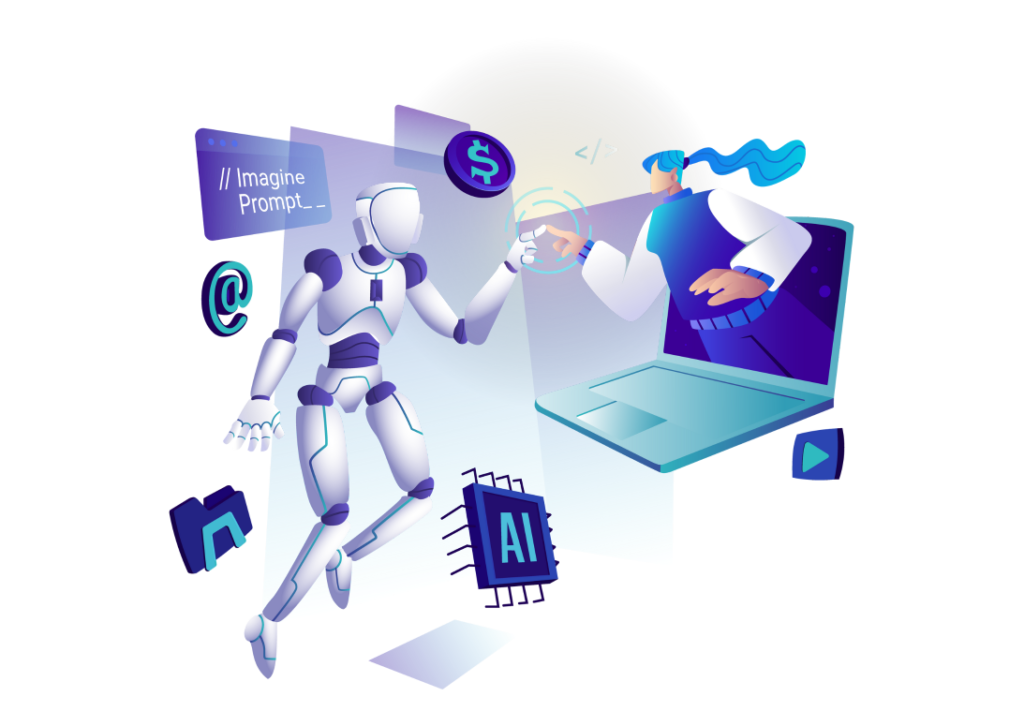In a rapidly shifting digital landscape, artificial intelligence continues to push the boundaries of what’s possible. Among its most captivating advancements is Generative AI, a technology that has emerged as a groundbreaking force in the world of creativity. Imagine machines that can dream, compose, and design independently, fueled by vast data sets and sophisticated algorithms.
In this blog, we will delve into knowing everything about Generative AI, exploring its potential, applications, and the profound impact it has on various industries.
What is Generative AI? Examples & Applications of Generative AI
What is Generative AI?
Generative AI can be referred to as artificial intelligence (AI) techniques and models designed to generate content, such as text, images, music, or other forms of data, similar to what humans might create. Generative AI uses machine learning algorithms, often based on neural networks, to produce new, original data samples that are indistinguishable from those made by humans. Here are some examples of Generative AI:
Text Generation:
- GPT-3 (Generative Pre-trained Transformer 3): This is known for generating human-like text. GPT-3 is used in chatbots, content generation, and even creative writing.
- BERT (Bidirectional Encoder Representations from Transformers): While BERT is primarily designed for understanding the context in text, it can also be used for text generation tasks.
Image Generation:
- GANs (Generative Adversarial Networks): These tools generate realistic images, including faces, artwork, and more. Variations like DCGANs and StyleGANs have enhanced image generation capabilities.
- BigGAN: This is an evolution of GANs, specialized in generating high-resolution images.
Music Generation:
- Magenta: It can create music in different styles and uses deep learning for making music and art.
Game Content Generation:
- Procedural Content Generation (PCG): This technology is used in game development to dynamically create game levels, maps, and landscapes.
Now, let’s see some of the important applications of generative AI.

What are Generative AI Applications?
Generative AI has found its footing in various domains, including:
Generative AI in Gaming
In the gaming industry, Generative AI has revolutionized game development in several ways. Beyond creating realistic environments, characters, and storylines, it plays a vital role in content generation. Developers can build game worlds dynamically, ensuring players experience unique challenges and landscapes. Additionally, Generative AI can adapt game difficulty in real-time based on a player’s skill level, enhancing the overall gaming experience. It’s also instrumental in creating non-player characters (NPCs) with advanced AI behaviors that make in-game interactions more immersive and dynamic.
Generative AI in Entertainment
Generative AI’s impact on entertainment extends beyond music and virtual actors. It can generate not only compositions, but also personalized playlists tailored to an individual’s musical preferences. When it comes to movies, Generative AI can assist in scriptwriting, generating dialogue, and even predicting audience reactions to specific scenes. It can also automate the creation of stunning visual effects, reducing production costs and time.
Generative AI in Product Design
Product designers leverage Generative AI to push the boundaries of creativity while adhering to design criteria and constraints. For example, it can simultaneously help automotive engineers optimize vehicle designs for fuel efficiency, safety, and aesthetics. It also helps create innovative building designs that balance functionality and sustainability. Additionally, Generative AI can assist in creating personalized product designs, allowing customers to have unique variations of products tailored to their preferences. This streamlines the design process, reduces waste, and opens new approaches for product customization.
Generative AI in Marketing
Generative AI has redefined marketing by automating content creation and analysis. Beyond personalized ads and product recommendations, it can generate engaging and contextually relevant marketing copy. It also plays a pivotal role in analyzing vast amounts of consumer data to optimize marketing strategies. Understanding customer behavior, sentiment, and trends helps marketers optimize their campaigns for maximum impact. Furthermore, Generative AI can create chatbots and virtual assistants that enhance customer interactions and provide personalized support.
Generative AI in Education
In the field of education, Generative AI is a dominant tool for improving the learning experience. It can generate customized learning materials, adapting content to individual students’ needs and learning styles. Additionally, it can automate the grading process for assignments and assessments, which saves educators valuable time and ensures consistency in evaluations. By personalizing education and providing valuable insights, Generative AI assists educators in addressing the diverse needs of students in modern educational settings.
How can I use Generative AI in my Business?
To incorporate Generative AI into your Business, identify areas where creative content generation or data synthesis adds value to your business. You need to explore existing Generative AI tools or develop effective solutions tailored to your requirements.
What are the Benefits of Generative AI?
Generative AI offers the following benefits:
- Fostering Creativity and Innovation: It inspires fresh ideas and content, amplifying creativity across domains.
- Enhancing Efficiency: By automating content creation and data synthesis, it conserves time and resources.
- Personalization: Generative AI crafts personalized content and recommendations, fostering more robust user engagement.
- Scalability: It scales content production to meet evolving demands.
- Ensuring Consistency: Generative AI maintains consistency in content style and quality.
Challenges of Generative AI
Though Generative AI offers immense promise, it also has noteworthy challenges:
- Ethical Concerns: Misuse of AI-generated content, like deep fakes, creates ethical concerns.
- Quality Control: Ensuring high-quality and relevant content poses a challenge.
- Data bias: AI models can pick up biases from their training data, keeping unfair stereotypes alive.
- Regulation: Confusing rules for AI-made content creates legal and moral problems.
Wrapping Up
Generative AI stands as a potent tool with wide-ranging applications. Its capacity to craft content, solve intricate problems, and foster creativity positions it as an invaluable asset. However, the technology simultaneously raises important ethical and regulatory questions. As the technology marches forward, Generative AI will undoubtedly play an even more pivotal role in shaping the future.

